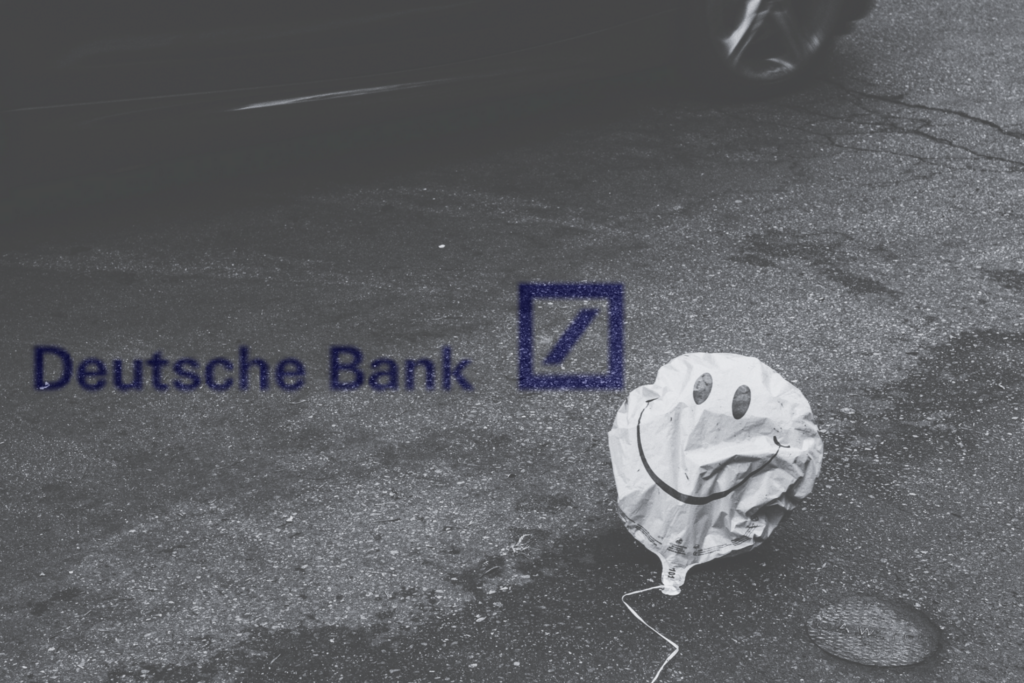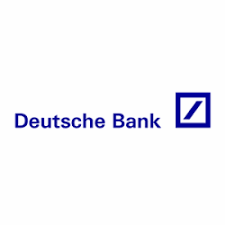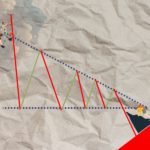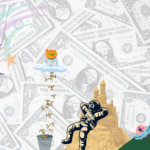
Market Update — What’s Up, Deutsche?
One after another — how will financial institutions survive the shockwaves of fear?

“Deutsche Bank has fundamentally modernized and reorganized its business and is a very profitable bank,” — Olaf Scholz, German’s Chancellor.
Amidst rising concern on how the German giant will fare, Olaf Scholz had to step in and reassure the market that Deutsche Bank (DBK) is not Credit Suisse and that DBK is not looking to head in the same direction as Credit Suisse.
Like it or not, one has to admit that banks run on trust, and the situation calls for people’s trust in banks under scrutiny. From the shocking news of Silicon Valley Bank’s failure, followed by Silvergate, Signature Bank, and the latest that we have was Credit Suisse which had to be rescued by their biggest rival, UBS.
It seems that the public’s sentiment on the banking sector is very brittle, and all that it takes to bring a bank down is a headline that sounds something along the line of “(Insert bank’s name), is it next?”.
These fears were not unfounded — although whether the fear was proportionate to the risk is another question. Many of the banks mentioned in 2023’s obituaries have a certain habit of raising people’s eyebrows (not in a good way).
A brief look into previous bank failures of 2023

Silicon Valley Bank (SVB): What better way to start off our list than with the bank that hit it off first, the SVB. SVB’s failure was due to its high number of uninsured deposits, and the fact that most of its deposits are invested in treasury bonds.
All of that is fine if things are looking normal, but SVB’s depositors are withdrawing their cash unlike what SVB hoped for, forcing SVB to make up for it by selling their bonds for a $1.8 billion loss. Simply, they put their money in a time capsule, hoping it to grow, and when depositors ask SVB for their money back, SVB had to break their time capsule at a loss to get a hand of that cash.
On another note, a huge chunk of SVB has just recently been bought by First Citizens, so it is now back in operation under a new hat.
Silvergate Bank: Silvergate Bank was liquidated by its parent company, Silvergate Capital, which also discontinued operations. Silvergate had its fair share of turmoil having had FTX, a disgraced cryptocurrency platform, as one of its biggest clients. Prior to its fall, Silvergate failed to file its annual report and was facing scrutiny by the officials. As with SVB, depositors started to rethink the bank’s credibility, and an $8 billion run on deposits marked Silvergate’s demise.
Signature Bank: Unlike its peers that fell from being exposed to scandals like FTX’s failure, money laundering involving cocaine, or having a huge chunk of their cash stacked in an asset that is falling in value, Signature Bank’s fall was rather benign. All that we are told so far is that Signature Bank was said to have failed in providing reliable data to regulatory bodies, which caused a confidence crisis in its management, and then it was followed by the deafening rings of depositors withdrawing their money. Much like those that fell before it. Signature Bank was then bought by New York Community Bancorp.
Credit Suisse: Credit Suisse’s fall is not very surprising, given the mood of the market right now. Much like Tiger Woods, the bank has quite a story to tell, and you’ll be left surprised at how they are still running.
Now, to name a few of Credit Suisse’s ‘notable’ events — in the year 2020, its Chief Executive was pressured to resign following an investigation that unveiled how the bank hired private investigators to spy on their ex-head of wealth management that moved to their rival, UBS.
Around a year after that, the bank suffered a $5.5 billion loss due to the default of Achegos. Then, a former Credit Suisse employee was found guilty in a cocaine cash laundering case.
The bank then went on to report the highest annual loss since 2008 earlier in 2023, before having its stock plundered down in March 2023, due to a statement made by Ammar al-Khudairy, Saudi National Bank’s (SNB) ex-Chairman who resigned due to the aftermath of his own statement.
Ammar al-Khudairy who chaired SNB mentioned that SNB will not increase its stake in Credit Suisse which is currently facing investors’ confidence issues — and as quick as a spark catches on to fuel, Credit Suisse’s already troubled situation saw itself going for a dizzying ride downhill.
To put matters into perspective, SNB is one of the biggest funders for Credit Suisse, and when daddy decides your allowances are no more, it calls for a certain level of self-reflection on Credit Suisse, which is now looking into the mirror only to see the reflection of what was once its own archrival — UBS.
Back to Deutsche

Deutsche Bank is not a small fry. This universal bank boasts around $1.43 trillion in assets at the end of 2022. In the year 2021, however, the bank reported declining investment growth (-9.97%) in the year 2021, with its assets declining by 0.10% in the same year.
However, that is only as far as the past is concerned. Fear is just, it devours the market indiscriminately. What happened to Deutsche was a risky road towards what would have been a possible pitfall of fear had it not been for Scholz’s recent assurance.
One of the main drivers for said fear was how its stock price plummeted over the course of one month. On March 3rd, 2023, Deutsche’s stock (ETR: DBK) was trading well at around €11.67. Fast forward to March 27th, 2023, the price saw a 21.38% fall to €9.06. That is definitely not something negligible for investors and depositors alike.
On Friday, the bank’s stock saw another fall of 11.57%, before going back up to make it a more acceptable -5.9%.
This came due to the cost of credit default swaps, i.e., the cost of insuring the bank’s debt against the risk of default, which rocketed to its highest since 2018. That
Currently, public confidence in the global banking sector is definitely rattled, with one after another bank biting the dust. DBK could even thank Scholz that their stock recovered before Friday’s close.
To DBK or not to DBK?
It is unclear whether Deutsche will join the others. What one can safely predict is that DBK will definitely take a few bruises, although the likeliness of it getting knocked out still hangs in the balance, given its formidable asset values and how it lacks the ‘it’ factors that claimed the lives of many banks earlier this month.
We are neither with nor against the bank, but if you are looking to buy any bank stocks, we would instead suggest that you look for the vultures that can afford to go for these dying banks — but be very careful in assessing the risks that these vultures just acquired with them.
How was it reflected in the U.S. market?

The U.S. market somewhat reacted positively to what Scholz had to say. All of the major indices in the U.S. were seeing green as it closes on Friday.
The S&P 500 Index saw its Friday closing with a 0.82% gain, while the Nasdaq Composite Index saw its Friday closing at a 0.66% gain, and the Dow Jones Industrial Average (DJIA) saw its Friday closing price hike by 0.64%.
Bottom line
- Deutsche will definitely suffer some injuries, but whether it will be fatal or not is still unsure.
- Scholz assured that Deutsche was profitable and refute any comparison between the German giant with Swiss’ Credit Suisse.
- Troubled SBV finally found a buyer.
- Scholz’s assurance, followed by SVB’s purchase tamed down the panic to a certain level.
- The U.S. market is more likely to open higher after a Friday of soothing news.
- The crisis is far from over, insofar as inflation is still high, the interest rate will likely remain as high.
- However, whether the interest rate will be raised as rampantly in the future is still highly debated.
The key-takeaways/market update is a series by AxeHedge, which serves as an initiative to bring compact and informative In/Visible Talks recaps/takeaways on leading brands and investment events happening around the globe.
Do keep an eye out for our posts by subscribing to our channel and social media.
None of the material above or on our website is to be construed as a solicitation, recommendation or offer to buy or sell any security, financial product or instrument. Investors should carefully consider if the security and/or product is suitable for them in view of their entire investment portfolio. All investing involves risks, including the possible loss of money invested, and past performance does not guarantee future performance.






